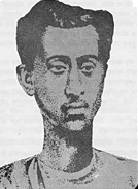Hira Lala Sen
| Hiralal Sen | |
|---|---|

Hiralal Sen
|
|
| Born | 1866 |
| Died | 1917 |
| Nationality | Indian |
| Occupation | Photographer, filmmaker |
Hiralal Sen (Bengali: হীরালাল সেন, Hiralal Shen) (1866–1917) was an Indian photographer generally considered one of India's first filmmakers. He is also credited with creating India's first advertising films and quite possibly India's first political film. A fire in 1917 destroyed all of his films.
Hiralal Sen's native home was in Bagjuri, a village in Manikganj, approximately 80 km from Dhaka, the present-day capital of Bangladesh. Although he was the son of a successful lawyer of a zamindar family of that region, he grew up in Calcutta. In 1898, a film troupe en route to Paris screened a certain Professor Stevenson's short film along with the stage show, The Flower of Persia at the Star Theatre in Calcutta. Borrowing Stevenson's camera, Sen made his first film, "A Dancing Scene" from the opera The Flower of Persia. With assistance from his brother, Motilal Sen, he bought an Urban Bioscope from Charles Urban's Warwick Trading Company in London. In the following year, with his brother, he formed the Royal Bioscope company.
In a creative career that extended up to 1913, Hiralal Sen made over forty films. Most of the films he made depicted scenes from theatrical productions played at Amarendra Dutta's Classic Theatre in Calcutta. At that time raw film was imported into the country. Between 1901 and 1904, he produced many films for Classic Theatre including Bhramar, Hariraj, and Buddhadev. His longest film, produced in 1903 and titled Alibaba and the Forty Thieves, was also based on an original Classic Theatre performance. However, not much is known about this feature film since it was never screened. He also produced a number of advertising films and newsfilms taking commissions. Having made two films advertising Jabakusum Hair Oil and Edwards Tonic, he may have been the first Indian to use film for advertising purposes.
...
Wikipedia
